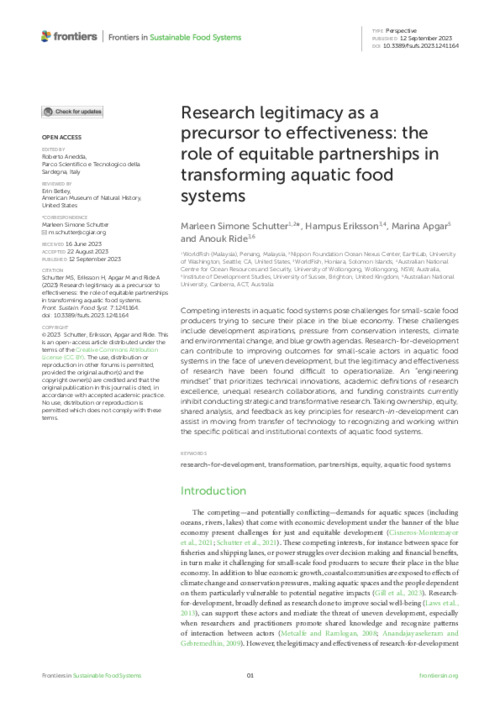Please use this identifier to cite or link to this item:
https://hdl.handle.net/20.500.12348/5656
Research legitimacy as a precursor to effectiveness: the role of equitable partnerships in transforming aquatic food systems
| dc.creator | Schutter, M. | en_US |
| dc.creator | Eriksson, H. | en_US |
| dc.creator | Apgar, M. | en_US |
| dc.creator | Ride, A. | en_US |
| dc.date.accessioned | 2023-11-16T20:01:23Z | |
| dc.date.available | 2023-11-16T20:01:23Z | |
| dc.date.issued | 2023 | en_US |
| dc.identifier.citation | Marleen Schutter, Hampus Eriksson, Marina Apgar, Anouk Ride. (12/9/2023). Research legitimacy as a precursor to effectiveness: the role of equitable partnerships in transforming aquatic food systems. Frontiers in Sustainable Food Systems, 7. | en_US |
| dc.identifier.issn | 2571-581X | en_US |
| dc.identifier.uri | https://hdl.handle.net/20.500.12348/5656 | |
| dc.description.abstract | Competing interests in aquatic food systems pose challenges for small-scale food producers trying to secure their place in the blue economy. These challenges include development aspirations, pressure from conservation interests, climate and environmental change, and blue growth agendas. Research-for-development can contribute to improving outcomes for small-scale actors in aquatic food systems in the face of uneven development, but the legitimacy and effectiveness of research have been found difficult to operationalize. An “engineering mindset” that prioritizes technical innovations, academic definitions of research excellence, unequal research collaborations, and funding constraints currently inhibit conducting strategic and transformative research. Taking ownership, equity, shared analysis, and feedback as key principles for research-in-development can assist in moving from transfer of technology to recognizing and working within the specific political and institutional contexts of aquatic food systems. | en_US |
| dc.format | en_US | |
| dc.language | en | en_US |
| dc.publisher | Frontiers Media | en_US |
| dc.rights | CC-BY-4.0 | en_US |
| dc.source | Frontiers in Sustainable Food Systems;7,(2023) | en_US |
| dc.subject | aquatic food syst | en_US |
| dc.title | Research legitimacy as a precursor to effectiveness: the role of equitable partnerships in transforming aquatic food systems | en_US |
| dc.type | Journal Article | en_US |
| cg.contributor.funder | Australian Center for International Agricultural Research | en_US |
| cg.contributor.funder | CGIAR Trust Fund | en_US |
| cg.subject.agrovoc | equity | en_US |
| cg.subject.agrovoc | partnerships | en_US |
| cg.subject.agrovoc | research-for-development | en_US |
| cg.subject.agrovoc | transformation | en_US |
| cg.subject.agrovoc | Fish | en_US |
| cg.contributor.affiliation | University of Sussex, Institute of Development Studies | en_US |
| cg.contributor.affiliation | WorldFish | en_US |
| cg.contributor.affiliation | Australian National University | en_US |
| cg.contributor.affiliation | Australian National Center for Ocean Resources & Security | en_US |
| cg.contributor.affiliation | University of Washington, Nippon Foundation Ocean Nexus Center | en_US |
| cg.identifier.status | Open access | en_US |
| cg.identifier.ISIindexed | ISI indexed | en_US |
| cg.contribution.worldfishauthor | Schutter, M. | en_US |
| cg.contribution.worldfishauthor | Eriksson, H. | en_US |
| cg.contribution.worldfishauthor | Ride, A. | en_US |
| cg.description.theme | Miscellaneous themes | en_US |
| cg.description.theme | Sustainable aquaculture | en_US |
| dc.identifier.doi | https://dx.doi.org/10.3389/fsufs.2023.1241164 | en_US |
| cg.creator.id | Hampus Eriksson: 0000-0003-1199-6889 | en_US |
| cg.subject.actionArea | Resilient Agrifood Systems | en_US |
| cg.contributor.initiative | Aquatic Foods | en_US |
Files in this item
This item appears in the following Collection(s)
-
Miscellaneous themes [906]
-
Sustainable aquaculture [2735]
